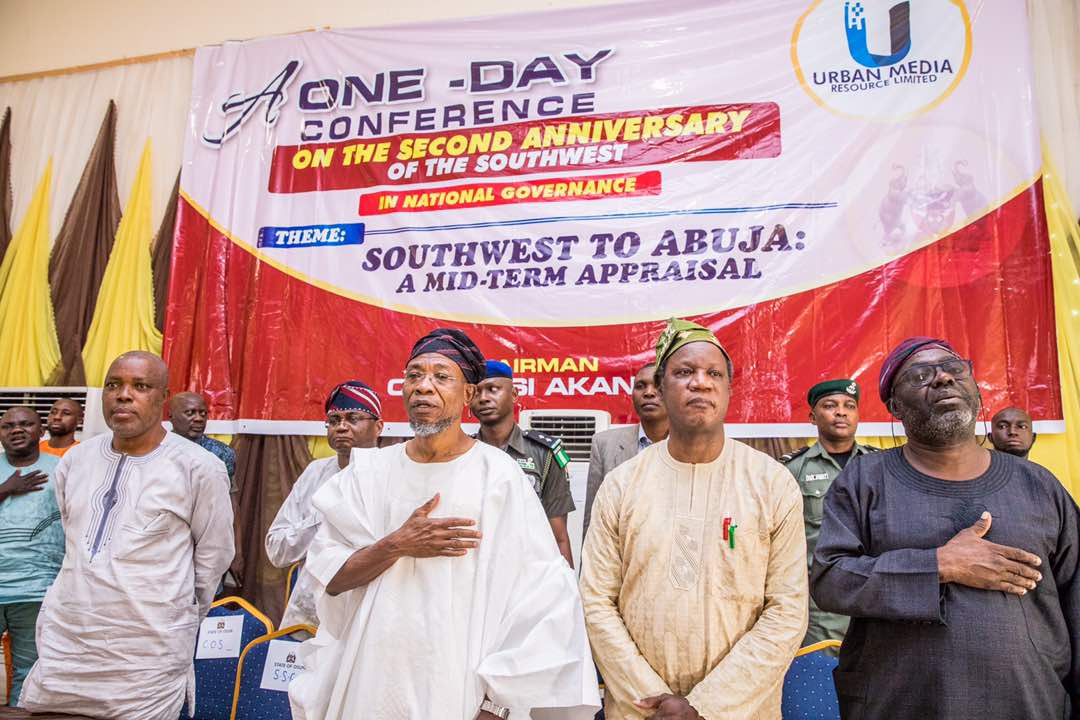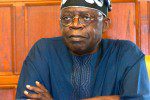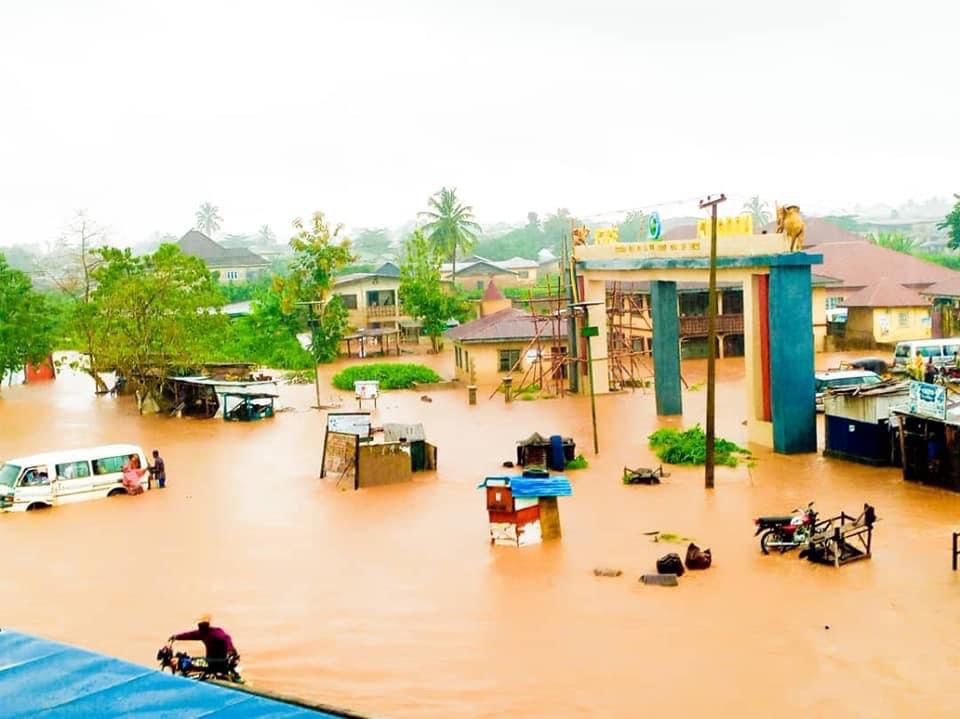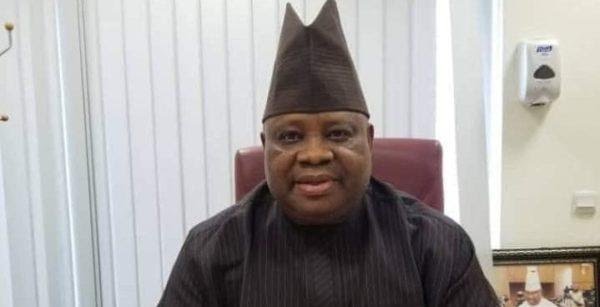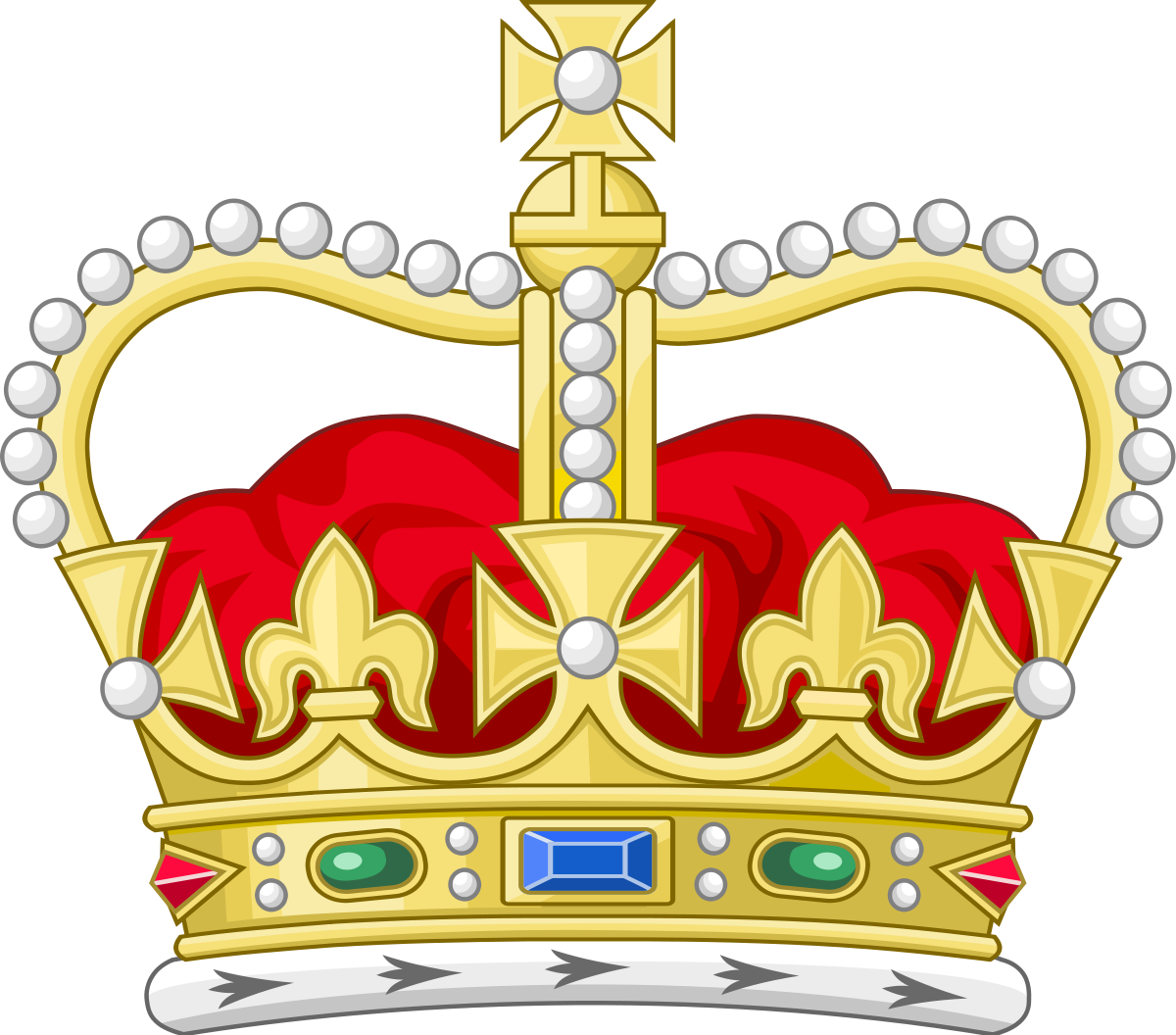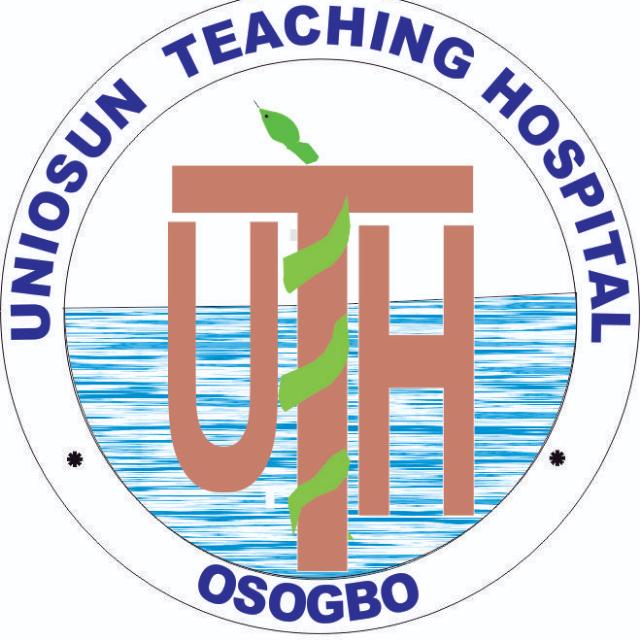Kazeem Mohammed Reviews The Discourse At A One-Day Conference On The Second Year Anniversary Of The Southwest In National Governance With The Theme; Southwest To Abuja: A Mid-term Appraisal
It took robust intellectual discussions for stakeholders in the Western Region to agree that the solution to the current political debate on restructuring of Nigeria can only be resolved in favour of adjustment of both constitutional and tax powers to reflect the urgent need to devolve power to the federating units and cut the excesses of federal intervention in those matters that are purely regional or local.
This was part of the resolution at a One-Day Conference on the Second Anniversary of the Southwest in National Governance, with a theme: ‘South West To Abuja: A Midterm Appraisal’, held at the Aurora Conference Centre, Osogbo, on Friday, September 15. The conference was organised by them Urban Media Limited.
Professor Mobolaji Aluko, the pioneer Vice Chancellor, Federal University, Otuoke, Bayelsa State spoke on, “The Southwest in National Governance: An appraisal of the first two years”, where he interrogated the major contribution of the South West to the President Muhammadu Buhari administration. Dr Charles Akinola, the Director-General, Office of Economic Development and Partnership, State of Osun, spoke on, “From Osun To Abuja: Investing in Social Infrastructure in A Recession” when he highlighted the social intervention policies of Osun government from which the Federal Government has had to take a cue. Senator Olubunmi Adetumbi of the Ekiti North Senatorial District (2011-2015) spoke on “Federalising Political Parties to Conform with Local Need – APC As a case study”, where he explored the imperatives of the APC to ‘federalise’ the party to reflect the socio-cultural and religious adversity of Nigeria.
After a robust discourse, where politicians, journalists, civil society organisations, academics, artisans, market men and women, religious leaders, and other stakeholders were participants, the conference, came up with a communiqué, which read:
“Conferees at the Osogbo conference observed that the idea of popular democracy has come to stay in Nigeria. They took notice of the facts that Nigeria’s democracy during the Fourth Republic has been in operation for the past eighteen years but that progressive politicians have not been part of the national government until the last two (2) years. Conferees also noted that the Western part of Nigeria being always in the progressive mode of opposition politics have therefore not had any opportunity of being part of the political forces which constituted the Federal Government until about the last 2 years.


“Conferees deliberated on the main theme of the conference, that is, an appraisal of the place of the Southwest in national political equation, the issues of economic development and the place of Osun State in the anchoring of development initiatives in the last six years and, the idea of federalising political parties in Nigeria.
“Conferees agreed that the Southwest’s relative importance in the federation of Nigeria is such that it stands in a better stead in the continuance and stability of the federation and not in its disintegration. That the Southwest has nonetheless in the last thirty years judging by the physical development and the distribution of infrastructure from the Federal centre to the states regressed significantly from being a leading region in the country to a position less than what she occupied before the 1970s.
“Conferees agreed that constitutional amendment to reflect significant transfer of power from the centre especially as contained in the Second Schedule to the Constitution of the Federal Republic of Nigeria 1999 (As Amended) to the States, would be an antidote to the regression of the Western part of Nigeria.
“Conferees noted that the most significant way by which development can be more meaningful to the people of Nigeria is to transfer resources from the few and the privileged to the majority of the pole through a system of welfare and social safety nets.


“Conferees agreed that the Government of the State of Osun has in the last six years significantly transferred public resources to the ordinary man and the majority of its citizens through its social welfare programmes such as O’Yes, O’Meal, O’Rehab, Agba Osun and Women Empowerment. It was also observed that an additional and effective way of transferring resources to the ordinary man would and should be through the capital budget in which resources are not spent on recurrent expenditure by paying salaries, overhead and wages alone but also on the simultaneous creation of physical infrastructure by which the majority of the people can be reached.
“Conferees discussed the issue of political federalisation by which it meant ensuring that all political parties in Nigeria and the leadership thereof reflect our federal character and that leadership should be progressive from the grassroots to the state and federal levels.
“Conferees agreed that this political orientation is not new to the western part of Nigeria but that there is the need to avoid falling into conservative and reactionary politics into which the southwest fell during 2003-2011.
“Conferees concluded that the solution to the current political debate on restructuring can only be resolved in favour of the continuance and growth of Nigeria and not in its dissolution but more important also, in the adjustment of both constitutional and tax powers to reflect the urgent need to devolve power to the federating units and cut the excesses of federal intervention in those matters that are purely regional or local”, the communiqué read in full.
Professor Aluko in his paper said the South-West political alliance has achieved mixed results across all sectors of governance, “but early days – as well as the health issues of the President – mean that much can yet be achieved”.
Tasking the South West leader to clearly define the restructuring they want in line with their agitation, he said, “The South-West leaders must act purposively and with consistency, practicing locally (at the state levels) what restructuring they wish at the national level”.


In his own paper, Akinola highlighted the specific social welfare and protection programmes of the Governor Rauf Aregbesola administration towards managing inequalities and vulnerabilities in Osun, saying the government has robustly designed and continued to faithfully implement its innovative social welfare and protection programmes, spread across the MDAs and sectors, targeting the neediest sectors of the population including women, children and the elderly.
“Through ardent financial engineering, the state government has been able to ride the storm and provide social welfare and protection to the most vulnerable segments. The Aregbesola government has robustly designed and is implementing innovative social welfare and protection programmes, spread across the different Ministries, Departments and Agencies (MDAs) and sectors, targeting some of the neediest sectors of the population including women, children and the elderly. The programmes include but are not limited to the following: Osun Elementary School Feeding and Health Programme (O-MEALS), Osun Youth Empowerment Scheme (OYES), Programmes for Women, Programmes for the Elderly ‘Agba Osun’, and programme for the destitute. These programmes are run to address some of the evidence-based vulnerabilities that are manifesting in the lives of the people”, he stated.
Akinola went memory lane that as far back as 2004, before the emergence of Ogbeni Aregbesola as the governorship candidate of the then Action Congress (AC), his advisory team had produced a green book titled ‘My pact with the people’ containing the Six Point Integral Action Plan that formed the philosophy of his administration. The six points are:
- Banish Hunger
- Banish Poverty
- Banish Unemployment
- Promote Healthy Living
- Promote Functional Education
- Promote Communal Peace and Progress
The Osun Youth Empowerment Scheme (OYES)
Akinola who recalled that the scheme was launched within the first 100 days of Aregbesola in office, through which 20,000 youth were engaged every two year said, “OYES is a revolving volunteers’ scheme designed to eliminate the frustration and paralysing effect of unacceptably high and seemingly intractable youth unemployment pervasive in Osun. It aims at creating a bridge to employment by equipping as many young men and women with positive work ethics and culture, self sustenance, resourcefulness and respect for the environment. It is designed to develop youths with Character and Competence.
“Over 40,000 youths have passed through the OYES Scheme and over 60 per cent of them have been given permanent employment in various ministries in the state. In February 2011, it was discovered that an unacceptably acute shortfall of teachers existed in the secondary schools. The Teachers Corps in OYES was set up through which 5400 graduate OYES cadets were seconded to schools.
“Through the scheme, N200 million is injected monthly into the State’s grassroots economy. This financial stimulant has recorded dramatic impact on local economies, creating multiplier effects for Osun people. Another spin off of the programme is that by gainfully engaging the youths, crime rate plummeted in Osun, making it one of the states with the lowest crime incidents in the country.
“OYES is designed by the state government to also engage and include Osun’s youth in the economic opportunities created by the O-MEALS. Over 300 OYES cadets have received training and a total loan of N100 million for them to act as cocoyam intermediaries between the cocoyam farmers and food vendors”.
The Home-Grown School Feeding Programmes (O-MEALS)
Akinola said the programme was designed as a win-win social safety net intervention for children living in poverty and food insecurity, with the aim to: tackle hunger and improve nutrition; increase children’s access, participation and achievement in school; and support local livelihoods.
He said the programme has the capacity to get children into school and retain them there to enhance enrolment and reduce absenteeism, saying it is expected to contribute to their learning, and enhance their cognitive abilities as hunger is eliminated.
This scheme, he said, has gained international endorsement and in Nigeria, just as it has helped to increase school enrolment by a minimum of 25 per cent within the first four weeks of commencement of the revised programme.
According to the National Bureau of Statistics, July 2013 edition, Osun has the highest population to primary school enrolment rates in Nigeria, a feat no doubt attributable to O-MEALS, among other factors.
Social Welfare Programme for the Elderly: ‘Agba Osun’.
He said, the condition of senior citizens warrants attention as many are hungry while many are ravaged with preventable diseases, saying lean resources of the state notwithstanding, the administration is committed to the welfare of the aged to bring them out of destitution, hunger, sickness and homelessness through the provision of welfare package for highly vulnerable senior citizens who have been identified as not having any form of guardian support.
“The scheme currently provides monetary support as well as free and personal medical attention because their other need as identified is healthcare. Those in need of urgent medical attention are therefore also treated. At some point, free eye treatment was provided for people in the state, in association with a partner organisation, Oranmiyan Worldwide. A large number of the elderly received free eyeglasses and free eye surgery. Osun is one of the few states where such scheme is being run in the country”.
The Osun Destitute Rehabilitation Programme (O-REHAB)
“This programme was introduced in 2011. The objective was to reach out to the destitute, the homeless and vagrants, who could also be psychotic. Those with physical or artificial disabilities are also helped. The state government under this programme was able to take all lunatics off the street. After given medical treatment, they were rehabilitated. While some were reunited with their families, some others were resettled, put under vocational apprenticeship and helped to establish a trade. The interesting discovery made was that all the lunatics put under treatment recovered and remained lucid as long they continued to take their medication.
The Osun Social Welfare and Protection Programmes Mutates
Akinola hinted that the social welfare and protection programmes of the state government have been run so successfully in Osun and have since been adopted by the Federal Government and other states.
OYES was understudied by the World Bank and recommended to the Federal Government and other states. It has now emerged in a variant as the Youth Employment and Social Support Operation (YESSO)ý.
OMEALS has also been adopted by the Federal Government and is being implemented in phases, all over the country. Other states joining the programme have sent personnel for training in Osun.
In his address, the Chairman of the conference, Chief Bisi Akande, the pioneer National Chairman of the APC said, “all over the world and particularly in Nigeria, the present business climate is not particularly positive and profitable for crude oil economy. Little do the members of the general public of Nigeria yet appreciate that government can no longer play “Father Christmas” and that the so-called free money from crude oil may no longer come in steadily if and when Europe, America and China totally convert to electric motors that consume no petroleum fuel.
He said, “the occasional negative reflections of the APC-controlled government results partly, from the silence of the APC party offices which should henceforth be encouraged to stimulate “deliberative Democracy” by frequently convening every organ of the party to brainstorming sessions where party leaders should discuss and be informed about various intended policies, plans and decisions of the party at its National Working Committee, at the state and the National Executive Committees, at the Board of Trustees, at the Elders’ Caucuses, at the congresses and the Convention levels.
“Through such regular policy deliberations and understandings, party members could become adequately informed and enlightened, and they would thus become regular mouthpieces and foot soldiers of the party and of its governments at all levels, with a view to favourably modulating and moderating the opinions of the general public, particularly now when Nigerians are reading back to APC its manifesto promises and are looking forward to the party and the government to bring about ‘True Federalism’, Akande stressed.



